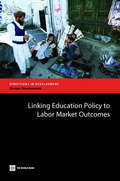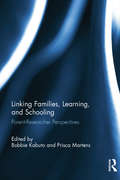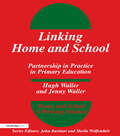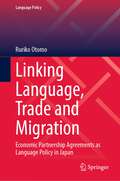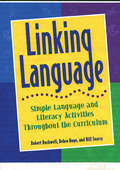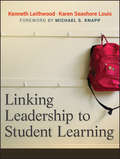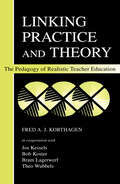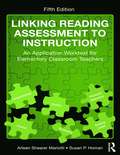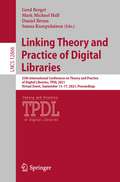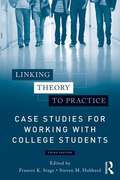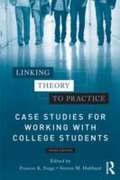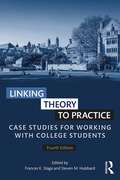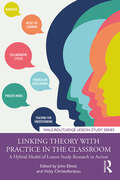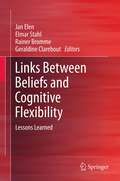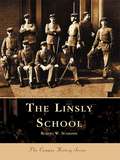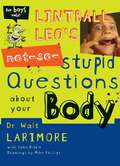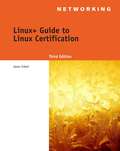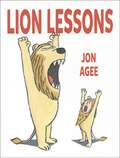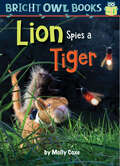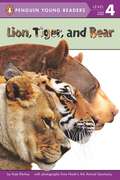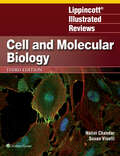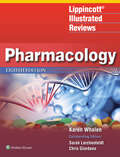- Table View
- List View
Linking Education Policy to Labor Market Outcomes
by Tazeen Fasih'Linking Education Policy to Labor Market Outcomes' examines current research and new evidence from Ghana and Pakistan-representative of two of the poorest regions of the world-to assess how education can increase income and help people move out of poverty. This study indicates that in addition to early investments in cognitive and noncognitive skills-which produce a high return and lower the cost of later educational investment by making learning at later ages more efficient-quality, efficiency, and linkages to the broader macro-economic context also matter. Education and relevant skills are still the key determinants of good labor market outcomes for individuals. However, education policies aimed at improving skills will have a limited effect on the incomes of that skilled workforce or on the performance of a national economy if other policies that increase the demand for these skills are not in place. For education to contribute to national economic growth, policies should aim at improving the quality of education by spending efficiently and by adapting the basic and postbasic curricula to develop the skills increasingly demanded on the global labor market, including critical thinking, problem solving, social behavior, and information technology.
Linking Families, Learning, and Schooling: Parent–Researcher Perspectives
by Bobbie Kabuto Prisca MartensParents who are also educational researchers have access to a domain that is highly complex and not always available to other scholars. In this book, parent-researchers provide theoretical and practical insights into children’s learning in the home and at school. Readers are given a window into learning in the home context and how all family members organize or engage in that learning. Working on two levels, the book develops scholarly discussions about learning in the home (how is it organized, who the participants are, and what children are learning), and it illustrates the impacts that outside institutions, in particular schools, have on families It is unique in showcasing parent-research as a type of research paradigm with particular aspects and challenges. Both teachers and researchers can learn from these studies as they show the impact that schooling has on families and how institutional discourses and beliefs can both positively and negatively affect the dynamics of any family.
Linking Home and School: Partnership in Practice in Primary Education (Home And School - A Working Alliance Ser.)
by Sheila Wolfendale Jenny Waller Hugh WallerFirst Published in 1998. Routledge is an imprint of Taylor & Francis, an informa company.
Linking Language, Trade and Migration: Economic Partnership Agreements as Language Policy in Japan (Language Policy #33)
by Ruriko OtomoThis book examines the effect of trade policy on language which represents an underrecognized area in the field of language policy and planning. It argues that trade policies like Japan’s Economic Partnership Agreements (EPAs) have important consequences for national language (education) policies and for discourses about language and nation. Since 2008, Japan has signed the EPAs with Indonesia, the Philippines and Vietnam to recruit migrant nurses and eldercare workers and manage their mobility by means of pre-employment language training and the Japanese-medium licensure examinations. Through the analysis of these language management devices, this book demonstrates that the EPAs are a manifestation and representation of contemporary language issues intertwined particularly with pressing issues of Japan’s social aging and demographic change. As the EPAs are intertwined with welfare, economy, social cohesion, and international political and economic relations and competitiveness, the book presents a far more complex picture of and a richer potential of language policy.
Linking Language: Simple Language and Literacy Activities Throughout the Curriculum
by Debra Hoge Bill Searcy Robert RockwellFilled with practical, everyday activities that build language development and early literacy into your daily schedule. Use circle time, snack time, dramatic play or any other time throughout the day to develop children's language skills. The authors discuss both expressive language (talking), and receptive language (listening), as well as the beginnings of reading and writing. Each cross-curricular activity includes ways to enhance children's vocabulary, questions to help the teacher evaluate the children's progress, an annotated list of books that relate to the activity, and age-appropriate suggestions for writing experiences.
Linking Leadership to Student Learning
by Kenneth Leithwood Karen Seashore LouisLinking Leadership to Student Learning Linking Leadership to Student Learning clearly shows how school leadership improves student achievement. The book is based on an ambitious five-year study on educational leadership that was sponsored by The Wallace Foundation. The authors studied 43 districts, across 9 states and 180 elementary, middle, and secondary schools. In this book, Kenneth Leithwood, Karen Seashore Louis, and their colleagues report on what they found. They examined leadership at each organizational level in the school system-classroom, school, district, community, and state. Their comprehensive approach to investigating school leadership offers a balanced understanding of how the structures within which leaders operate shape what they do. The results within will have significant implications for future policy and practice. Praise for Linking Leadership to Student Learning "Kenneth Leithwood and Karen Seashore Louis offer a seminal new contribution to the leadership field. They provide a rich and authoritative evidence base that demonstrates clearly just why school leadership is so important and how it promotes successful student learning. "-Pamela Sammons, Ph. D. , Professor of Education, Department of Education, University of Oxford, Oxford "This ambitious, groundbreaking, and thought provoking treatment of the link between school leadership and student learning is a testament to the outstanding work of these exemplary scholars. This is a 'must read' for academics and practitioners alike. "-Martha McCarthy, President's Professor, Loyola Marymount University, and Chancellor's Professor Emeritus, Indiana University "The question is no longer whether school and district leader's impact student learning, but rather how they do it. The authors provide a convincing answer, one that recognizes the crucial interaction between leader and locality. "-Daniel L. Duke, Professor of Educational Leadership, University of Virginia
Linking Practice and Theory: The Pedagogy of Realistic Teacher Education
by Fred A.J. Korthagen Jos Kessels Bob Koster Bram Lagerwerf Theo WubbelsAlthough the idea of the reflective practitioner is embraced by many, there is still a need to understand how teachers' practical experience and the theoretical insights of researchers can be linked in teacher education. This book offers a framework for addressing this problem. It brings together 15 years of experience in teacher education and research, based on Korthagen's concept of "realistic teacher education" which is well known in Europe and gaining interest in North America. Set up as a journey back and forth between practice and theory, this book is not only about linking them but models how it can be done, providing both practical solutions and research-based theoretical foundations. Linking Practice and Theory: The Pedagogy of Realistic Teacher Education: * serves as a guidebook for teacher educators, with many practical ideas and guidelines; * prepares the reader for a fundamental shift in thinking about teacher education; and * uses an international perspective in analyzing real, practical experience in teacher education, in the Netherlands and in other countries.
Linking Reading Assessment to Instruction: An Application Worktext for Elementary Classroom Teachers
by Susan P. Homan Arleen Shearer MariottiNow in its Fifth Edition, this text applies current theory to classroom practice by providing, in each chapter, a brief explanation of major concepts followed by guided practical experience in administering, scoring, and interpreting reading assessment techniques. The Fifth Edition is revised and updated to reflect recent developments in the field. New activities are included throughout. A Companion Website for instructors and students, a value-added feature, is new for this edition. Like previous editions of this popular text, this edition Emphasizes the use of assessment and diagnosis for instructional decision making Stresses the use of informal assessment techniques - reflecting the current emphasis in educational assessment theories - but also includes usage of standardized test scores Provides numerous classroom-tested, hands-on activities, giving students step-by-step experiences in administering, scoring, and interpreting assessment techniques This text covers assessment/diagnosis in all five critical reading areas: phonemic awareness, phonics, vocabulary, fluency, and comprehension. It is designed for undergraduate and graduate courses in reading diagnosis, reading methods that include a diagnostic component, and for in-service courses on reading/literacy development and diagnosis. http://cw.routledge.com/textbooks/9780415802093/
Linking Theory and Practice of Digital Libraries: 25th International Conference on Theory and Practice of Digital Libraries, TPDL 2021, Virtual Event, September 13–17, 2021, Proceedings (Lecture Notes in Computer Science #12866)
by Gerd Berget Mark Michael Hall Daniel Brenn Sanna KumpulainenThis book constitutes the proceedings of the 25th International Conference on Theory and Practice of Digital Libraries, TPDL 2021, held in September 2021. Due to COVID-10 pandemic the conference was held virtually.The 10 full papers, 3 short papers and 13 other papers presented were carefully reviewed and selected from 53 submissions. TPDL 2021 attempts to facilitate establishing connections and convergences between diverse research communities such as Digital Humanities, Information Sciences and others that could benefit from ecosystems offered by digital libraries and repositories. This edition of TPDL was held under the general theme of “Linking Theory and Practice”. The papers are organized in topical sections as follows: Document and Text Analysis; Data Repositories and Archives; Linked Data and Open Data; User Interfaces and Experience.
Linking Theory to Practice – Case Studies for Working with College Students
by Frances K. Stage Steven M. HubbardFramed by an overview of theories that guide student affairs practice, the cases in this book present a challenging array of problems that student affairs and higher education personnel face, such as racial diversity, alcohol abuse, and student activism. The revised edition has thirty new cases, with content on issues that reflect the complexity of today's environment at colleges and universities, including the expanded use of social networking, the rise in mental health issues, bullying, study abroad, and athletics. The fully updated edition includes new references, expanded theory with an increased emphasis on race, ethnicity, and sexual orientation, and three entirely new chapters on admissions, student identity, and campus life. An excellent teaching tool, this book challenges students to consider multiple overlapping issues within a single case study. Features include: A two-part structure that sets the stage for case study methods and links student affairs theory with practical applications Cases written by well-known and respected contributors set in a wide variety of institution types and locations Over 35 complex case studies reflecting the multifaceted issues student affairs professionals face in today's college environment.
Linking Theory to Practice: Case Studies For Working With College Students (Third Edition)
by Frances K. Stage Steven M. HubbardFramed by an overview of theories that guide student affairs practice, the cases in this book present a challenging array of problems that student affairs and higher education personnel face, such as racial diversity, alcohol abuse, and student activism. The revised edition has thirty new cases, with content on issues that reflect the complexity of today's environment at colleges and universities, including the expanded use of social networking, the rise in mental health issues, bullying, study abroad, and athletics. The fully updated edition includes new references, expanded theory with an increased emphasis on race, ethnicity, and sexual orientation, and three entirely new chapters on admissions, student identity, and campus life. An excellent teaching tool, this book challenges students to consider multiple overlapping issues within a single case study. Features include: A two-part structure that sets the stage for case study methods and links student affairs theory with practical applications Cases written by well-known and respected contributors set in a wide variety of institution types and locations Over 35 complex case studies reflecting the multifaceted issues student affairs professionals face in today's college environment.
Linking Theory to Practice: Case Studies for Working with College Students
by Frances K. Stage Steven M. HubbardFramed by an overview of theories that guide student affairs practice, the cases in this book present a challenging array of problems that student affairs and higher education personnel face on campus, such as racial diversity, alcohol abuse, and student activism. This revised fourth edition contains 20 new cases reflecting current campus issues, including identity, study abroad, social media, bullying, housing and food insecurity, student activism, and other perennial campus issues. An excellent teaching tool, this book provides a comprehensive and realistic set of challenges to prepare aspiring student affairs professionals for the increasingly complex college environment. Features include: A structure that sets the stage for case study methods and links student affairs theory with practical applications. Cases written by well-known and respected contributors set in a wide variety of institution types and locations. Over 35 complex case studies reflecting the multifaceted issues student affairs professionals face in today’s college environment.
Linking Theory with Practice in the Classroom: A Hybrid Model of Lesson Study Research in Action (WALS-Routledge Lesson Study Series)
by John Elliott Vicky ChristoforatouFocusing on the professional learning journeys of practising teachers and their tutors, this book takes readers through the experiences of teachers on the Developing Innovative Pedagogies through the Lesson Study module at the University of East Anglia.Building on the perspectives of teachers practising Lesson Study, the book delves into the design of a series of action research cycles to solve authentic learning and teaching problems in a variety of educational settings. In addition to theoretical tools and concepts on pedagogy, this book gives voice to teachers who become researchers while crossing the boundaries of school and university and the boundaries of theory and practice. The teacher researchers ask their own questions, test their hypotheses and work collaboratively with their school colleagues to experiment with teaching strategies aimed at learning with understanding. The chapters feature the voices of the pupils themselves and their experiences of learning within a range of educational settings and phases.Written for teachers, leaders in education, teacher educators and researchers, this book shows that the combination of good learning theories and teacher collaboration help bridge the gap between theory and practice in teachers’ professional learning and enable learners to deepen their knowledge and understanding.
Links Between Beliefs and Cognitive Flexibility
by Geraldine Clarebout Elmar Stahl Jan Elen Rainer BrommeWith the world and its structures becoming ever more complex, and the nature of future employment becoming ever more unpredictable, the notion of 'cognitive flexibility' has a high profile in educational and psychological debate. The contributions in this volume analyze the nature of cognitive flexibility, as well as the impact of different types of beliefs on cognitive flexibility. Making adequate decisions requires considering input from a variety of continuously evolving sources rather than adhering to predetermined procedures. Adopting a position in a debate necessitates the critical evaluation of different alternatives, while solving a problem entails selecting appropriate problem-solving strategies. Meanwhile, studying requires students to integrate a range of interventions, and treating a patient involves making a differential diagnosis. The common factor, cognitive flexibility, lies at the core of effective functioning in complex, domain-specific environments. Cognitive flexibility can be described as the disposition to consider diverse information elements while deciding on how to solve a problem or to execute a learning-related task in a variety of domains. The concept of 'disposition' implies that individuals will not always demonstrate cognitive flexibility even if they are in principle able to act in a cognitively flexible way. The notion does not require that alternatives are always deliberately considered, which is why this volume's tandem discussion of beliefs is key element of the discussion. Beliefs play a central role in cognitive flexibility and relate to what individuals consider to be important, valid and/or true. Of specific interest is the relationship between epistemological beliefs and cognitive flexibility, especially as a particular subset of epistemological beliefs seems to be a prerequisite to a cognitively flexible disposition.
Links To Learning: A Curriculum Planning Guide for After-School Programs
by National Institute on Out-of-School TimeThe first of its kind, this book will give after-school programs all of the tools they need for planning a well-balanced program, one that responds to the increasing call for academics in after school while addressing the full range of children's developmental needs. Provides an overview of learning and child development; offers tips and tools for selecting, planning developing and evaluating after-school activities; and demonstrates how to link these activities to sample learning and quality standards. Introduces the reader to curriculum resources focusing on seven "key learning areas" believed to be central to comprehensive, high-quality after-school programs.
Links: My Family in American History
by William A. LinkArthur Link (1920-1998) was one of the great historians of his generation, a prolific author with a wide following inside and outside the profession. For many years the foremost authority on Woodrow Wilson, he wrote a five-volume biography of the president and edited a sixty-nine volume edition of Wilson’s papers.Margaret Link (1918-1996), his wife and fellow North Carolinian, was the emotional core of the family. As an activist, she helped form an interdenominational crisis ministry in Princeton that reached out to the poor with counseling, clothing, and food, and she was a cofounder and president of the Association for the Advancement of Mental Health.In Links, their youngest son--an accomplished and award-winning historian--offers a moving and unsentimental biography of two individuals who experienced the intense change and tumult of the South during the mid-twentieth century. Drawing from a rich trove of letters, interviews with friends and family, and unique insights, Link offers a highly detailed, evocative portrait of the coming of age and lifelong partnership of his parents. Links combines the objectivity and critical judgment of the professional historian with the subjectivity and deep emotional connection of the memoirist who participated directly in part of the story.
Linsly School, The
by Robert W. SchrammOlder than the state of West Virginia itself, The Linsly School was the first college preparatory school established west of the Alleghanies. The school was originally founded in 1814 as Wheeling Lancastrian Academy, and became an all-boys institution at the beginning of the Civil War. In 1876, Linsly began serving as a military institution. It is the Linsly doctrine that nothing of substantial or lasting value comes without hard work and sacrifice, and its existence today is testament to that philosophy. Adhering to its motto, "Forward and no retreat!," the school carried itself through almost two centuries of war, pestilence, and economic depressions to become an honored and beloved institution in which generations of students take tremendous pride.Today's non-military, coeducational Linsly School continues to enrich students in grades five through twelve with values of honesty, sportsmanship, hard work, and discipline. Through rare and never-before-seen vintage photographs, The Linsly School chronicles the fascinating and inspiring story of the tribulations and successes of the school itself, and the people who worked, sacrificed, and dreamed to make it happen.
Lintball Leo's Not-So-Stupid Questions About Your Body
by John Riddle Walt Larimore“Everything a boy should know, but won’t ask!” Finally, everything you wanted to know about your body, but you’ve just been too chicken to ask. Lintball Leo’s Not–So-Stupid Questions About Your Body is the first book for boys that gives honest answers to real questions about your body from a biblical perspective. No, you’re not falling apart—you’re just growing up! But there’s no need to fear, when Lintball Leo is near. He’s your personal guide to understanding your body. With information about everything from steroid use to body parts, there’s not a question Lintball Leo hasn’t heard. These aren’t questions some adult made up, but they’re real questions asked by real boys just like you. You want to know the truth? Now you can, because Lintball Leo’s Not–So-Stupid Questions About Your Body gives you the facts—no holds barred! Through imaginative and innovative products, Zonderkidz is feeding young souls.
Linux+ Guide To Linux Certification (Third Edition)
by Jason W. EckertLINUX+ GUIDE TO LINUX CERTIFICATION, THIRD EDITION offers the most up-to-date information to empower users to successfully pass CompTIA's Linux+ (Powered by LPI) Certification exam, while maintaining a focus on quality, classroom usability, and real-world experience. This complete guide provides not only the conceptual knowledge, but also the hands-on skills necessary to work with the Linux operation systems in a network administration environment. Comprehensive coverage includes updated information pertinent to the latest Linux distributions, as well as new storage technologies such as LVM and ext4. Readers will learn about new and expanded material on key job-related networking services including FTP, NFS, Samba, Apache, DNS, DHCP, NTP, RADIUS, LDAP, Squid, Sendmail, Postfix, X, SSH, VNC, SQL, and updated information on security practices and technologies. The Hands-On Projects help learners practice new skills, and review questions and key terms reinforce important concepts.
Lion Lessons
by Jon AgeeWith the wit and read-aloud appeal of Peter Brown&’s Children Make Terrible Pets and William Steig&’s Pete&’s a Pizza, this funny, fierce picture book teaches kids just what it takes to be a great lion There are seven steps to becoming a proper lion, including Looking Fierce, Roaring, Prowling Around, and Pouncing. Our young hero, a rather meek and scrawny human boy, does his best to learn the necessary skills during his training with a master instructor (who just happens to be a real lion). After a grueling set of lessons, the boy discovers that that the final step—Looking Out for Your Friends—is the most important of all. That&’s how any kid can earn his lion diploma (not to mention the affection of every cat in town).
Lion Spies a Tiger (Bright Owl Books)
by Molly CoxeLion has pride in his sight. But at night? His eyes aren't fine. This fun photographic easy-to-read story features the long "i" vowel sound. Kane Press's new series of super simple easy-to-reads, Bright Owl Books, adds Molly Coxe's five fun photographic long vowel stories, which are each only around 100–200 words. Molly Coxe's stories help kids learn to read by teaching the basic building blocks of reading—vowel sounds. With a note to parents and teachers at the beginning and story starters at the end, these books give kids the perfect start on educational success. Bright Owl Books make bright owl readers!
Lion's in a Flap - A book about feeling worried (Behaviour Matters #5)
by Sue GravesA lively picture book that examines the issue of being worried in an amusing but reassuring way through animal characters - perfect for young children who have feelings of anxiety and worry. The story offers a gentle way in to discussing the things children worry about. At the end of the story there are notes for parents and teachers with suggestions of ways to help children deal with worry.Lion is off on a school trip to Jungle Land - the most exciting theme park EVER! He should be thrilled, but he cannot stop worrying and it's ruining the trip for him. Can Miss Bird and his friends help him to relax and have fun?It is part of a series Behaviour Matters, which is perfect for sharing with children as a gentle means of discussing their emotions, boosting self-esteem and reinforcing good behaviour. Each book has a fun story featuring fantastic characters which is backed up by suggestions for activities and ideas to talk through together. They support the Personal, Social and Emotional Development Area of Learning in the Early Years Foundation Stage.'Excellent for sharing and encouraging discussion... we can all learn from the approach taken in this series.' Parents in Touch
Lion, Tiger, and Bear (Penguin Young Readers, Level 4)
by Kate RitcheyLion, Tiger, and Bear, oh my!In Locust Grove, Georgia, an American black bear named Baloo, a lion named Leo, and a Bengal tiger named Shere Kahn all live happily together. The three animals were rescued over twelve years ago and brought to live at Noah’s Ark Animal Sanctuary. The trainers there tried to separate the trio for fear that fights would break out. The animals did start acting out—but only until they were reunited in the same pen. This true story of unlikely friendship is filled with photographs supplied directly from Noah’s Ark Animal Sanctuary.
Lippincott Illustrated Reviews: Cell and Molecular Biology (Lippincott Illustrated Reviews Series)
by Nalini Chandar Susan ViselliUp to date, easy to use, and rich with vibrant illustrations, Lippincott® Illustrated Reviews: Cell and Molecular Biology, 3rd Edition, provides a highly visual presentation of essential cell and molecular biology with a focus on topics related to human health and disease. This engaging approach incorporates all of the most popular features of the bestselling Lippincott® Illustrated Reviews series, including abundant full-color illustrations, chapter summaries, and review questions that link basic science to real-life clinical situations. The updated, versatile 3rd Edition can be used for a standalone cell biology course in medical, health professions, or other graduate and upper-level undergraduate programs; as a review for course and board exams; or in conjunction with other Lippincott® Illustrated Reviews for a seamless integrated course.
Lippincott Illustrated Reviews: Pharmacology (Lippincott Illustrated Reviews Series)
by Karen WhalenStudents’ favorite review resource for studying the essentials of medical pharmacology, Lippincott® Illustrated Reviews: Pharmacology, 8th Edition, presents up-to-date drug information in an accessible format ideal for effective review. Part of the popular Lippincott® Illustrated Reviews series, this concise resource features clear writing and hundreds of illustrations that break down complex pharmacological information, so it is understandable and accessible. Sequential images present mechanisms of action and focus on showing rather than telling students how drugs work, and review questions with answers deliver powerful, practical exam preparation.
